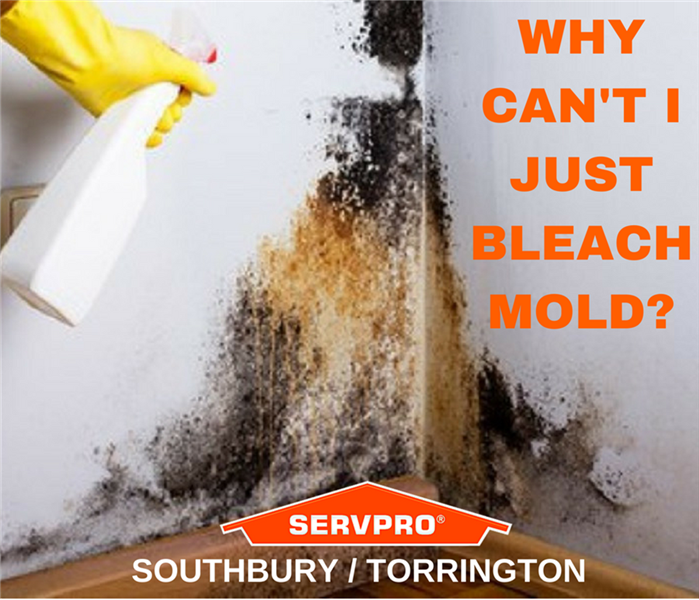Does Bleach Kill Mold Found in Your Home?
5/30/2018 (Permalink)
 Many customers ask us about using bleach on mold found in their homes. Here's why SERVPRO of Southbury/Torrington recommends against this practice.
Many customers ask us about using bleach on mold found in their homes. Here's why SERVPRO of Southbury/Torrington recommends against this practice.
When it comes to mold found inside of a home, there can be a lot of confusion. A google search will provide you with many conflicting "facts" and it's not always easy to determine what action you should take if you find mold in your home. In the next few weeks, we will be addressing some of the common misconceptions about mold to help you have a better understanding of it and its impact on your home and your health. Today, we address one of the most common myths about mold which is that bleach kills mold.
We understand how this myth originated. Bleach is an awesome disinfectant and was once recommended by both OSHA and the EPA as an effective mold remover. They have both since changed their recommendations and now advise against bleach for mold removal.
Bleach Cleans Only the Surface
To ensure survival, mold roots itself in porous materials like wood and sheetrock. Bleach does not penetrate deep into porous materials. Mold remediation requires a special cleaning process that reaches deep down into wood and other porous building materials to remove or "pull out" the roots. When bleach is applied, the mold might appear to be gone (since the surface was bleached white) however in a few weeks it reappears.
Bleach can be effective at removing surface mold on some hard, non-porous materials, such as tile and glass. So, if you need to use bleach on your bathtub or toilet bowl, go for it! Otherwise, consider an alternative treatment.
Bleach Feeds Mold, Adding to its Growth
What further exacerbates the situation is the fact that bleach is comprised 90% of water, which is essential for the growth of mold. So, the application of bleach actually feeds the mold spores and can allow it to grow even faster. Although the surface may look bleached and clean, the remaining spores will root deeper, stronger and will often return worse than before.
Bleach Damages Wood
Chlorine bleach is caustic and causes a chemical reaction that erodes and degrades the wood it has been applied to. The fibers are broken down and the structural integrity of your home can be compromised. You will be left with mold and damaged wood. This is not the result you were hoping for.
Mold Spores are in the Air
Bleach is not effective in killing mold spores, which are airborne. At SERVPRO of Southbury/Torrington, we use specialized filtration equipment, which allows our crew to capture microscopic mold spores out of the air. We utilize powerful “air scrubbers” and HEPA vacuums to prevent the spread of these mold spores while the mold remediation is in process.
For tips on preventing mold growth in your home, visit this page. If you have any questions about mold that you find in your Middlebury home, please feel free to call us at (203)267-6262.




 24/7 Emergency Service
24/7 Emergency Service